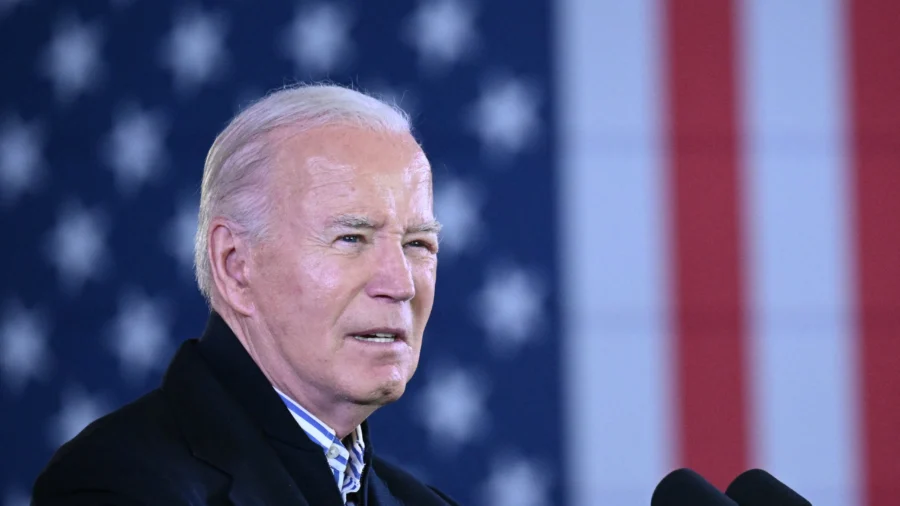President Joe Biden said Friday that he will commute the sentences of nearly a dozen people who have been serving “disproportionally long” prison sentences for non-violent drug offenses.
These individuals, President Biden said, “would have been eligible to receive significantly lower sentences if they were charged with the same offense today.”
The president will also sign a proclamation to pardon certain marijuana offenses, building on action he took in October 2022 to pardon thousands of Americans who were convicted of simple marijuana possession.
This expanded pardon proclamation, like its predecessor, only applies to U.S. citizens and lawful permanent residents. The White House said explicitly it “does not apply to individuals who were non-citizens not lawfully present in the United States at the time of their offense.”
In terms of scope, the new pardon forgives federal and Washington, D.C. offenses for “simple possession of marijuana, attempted simple possession of marijuana, or use of marijuana,” regardless of whether the offenders “have been charged with or prosecuted for these offenses on or before the date of this proclamation,” meaning that it will cover people who committed cannabis possession crimes after President Biden’s initial October 2022 pardon.
The new pardon does not apply to those who have been jailed for selling marijuana—which remains a federal crime—or other marijuana offenses such as driving under the influence of an illegal substance. Neither does it affect people who violated state law.
“Criminal records for marijuana use and possession have imposed needless barriers to employment, housing, and educational opportunities,” President Biden said in a statement. “Too many lives have been upended because of our failed approach to marijuana. It’s time that we right these wrongs.”
“Just as no one should be in a federal prison solely due to the use or possession of marijuana, no one should be in a local jail or state prison for that reason, either,” the president continued, calling on governors to “do the same with regard to state offenses and applaud those who have since taken action.”
Changing Schedule
The move comes as the Drug Enforcement Administration (DEA) is weighing a recommendation from the U.S. Department of Health and Human Services (HHS) to reclassify marijuana as a Schedule III substance, the same category as low-risk prescription drugs. This HHS proposal itself stemmed from a review that President Biden ordered last October when he issued his initial marijuana pardon action.
Marijuana is currently listed in Schedule I, a category for drugs with no currently accepted medical use and a high potential for abuse, along with heroin, lysergic acid diethylamide (LSD), and crack cocaine. Cannabis advocates have long claimed that moving marijuana from Schedule I to Schedule III would boost drug research, generate more revenue, and result in fewer arrests.
In September, the HHS made a formal recommendation that cannabis be moved out of Schedule I and into Schedule III. The DEA, which has the final say on whether to reclassify the drug under federal law, is still reviewing the proposal.
As part of his 2020 campaign promises, President Biden pledged to “decriminalize cannabis use and automatically expunge prior convictions.” He also supported “the legalization of cannabis for medical purposes,” arguing that decisions regarding legalization for recreational use should be left up to the states.
Former President Donald Trump, who remains the Republican Party’s clear 2024 frontrunner, has acknowledged that marijuana use can lead to “significant damage,” although many voters are in favor of legalizing it.
“You see the same studies: It’s not helping people,” President Trump said in May in an interview with NewsMax. “I mean, studies are saying that it does damage. It does significant damage—and yet, from a voting standpoint, it’s a pretty popular thing.”
“Canada has gone all that way [with cannabis legalization], and other countries have gone all that way. Some countries won’t do it,” he said. “But I am going to take a look at some final results. But indications are that is not exactly helpful.”
At state level, the recreational or adult use of cannabis has so far been legalized in the District of Columbia and 24 states, including Delaware, Minnesota, and Ohio, where voters approved ballot measures that legalize recreational marijuana in their states in general elections this November.
The medical use of cannabis has been legalized in 40 states and the District of Columbia. The latest addition to this group is Kentucky, where Gov. Andy Beshear, a Democrat, signed into law a legalization bill this March in what he called an effort to reduce people’s reliance on addictive opioids.
From The Epoch Times

